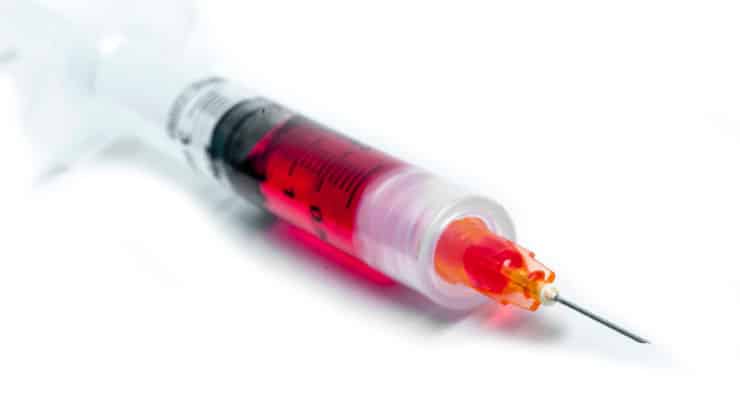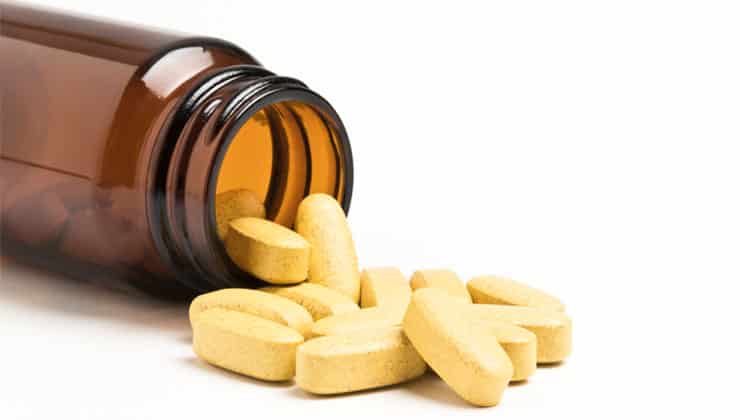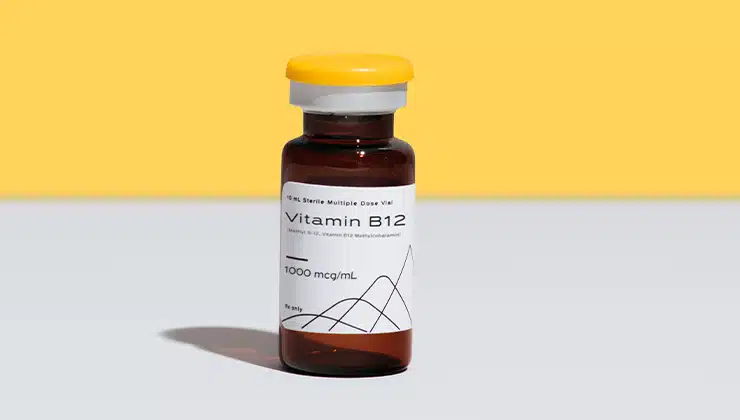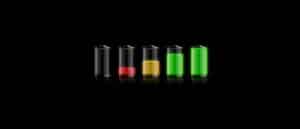B12 Shots Are Safe, but Keep an Eye Out for These Mild Side Effects
Vitamin B12 is kind of a big deal. Your body needs it to produce red blood cells and DNA and to keep your brain and nerve cells functioning. Running a B12 deficit—which about six percent of Americans under the age of 60—and 20 percent of those over 60 do (1)—puts you at risk for muscle weakness, fatigue, depression, memory issues, erectile dysfunction, and a cluster of symptoms that can be so severe that they’re debilitating.
Your body can’t make vitamin B12 on its own. You need to get your recommended daily intake of 2.4 micrograms (mcg) per day (1) from food, oral supplements, or injections. The good news: All forms of B12 supplements are relatively safe and can help you sidestep symptoms of a deficiency. The even better news: side effects from vitamin B12 supplements are usually mild, says Richard Foxx, M.D., a board-certified physician who treats hormonal disorders and nutritional deficiencies.
For most people with a vitamin B12 deficiency, oral supplements are an effective way to bring your levels up to normal, says Foxx, and research backs this up (2). Still, there are cases where B12 injections are the better bet.
Here’s what to know about B12 shot side effects—and the benefits of getting B12 injections.

Why Choose B12 Shots
Few people put “getting more shots” on their bucket list. But there are times when you might want to consider poking yourself with a needle.
“Injections are good at treating more severe deficiencies,” says Foxx. They’re also helpful for people who don’t get enough B12 from their diet (spoiler: often vegetarians and vegans) and for people whose guts can’t break down and absorb the vitamin.
For example, older people (because absorption declines with age) and those with gut-related conditions such as celiac disease and Crohn’s disease may struggle to absorb enough vitamin B12 to stave off symptoms of a deficiency, says Foxx.
Your ability to absorb vitamin B12 depends if you have enough of a protein called intrinsic factor (IF) in your stomach. IF binds to vitamin B12 so your body can absorb it.
People who don’t produce enough IF can become deficient in vitamin B12, and are good candidates for B12 shots, says Foxx.
Unlike food or oral supplements, vitamin B12 injections—which are injected under the skin or directly into the muscle—bypass your gut and go directly into your bloodstream to help counteract the effects of a deficiency, says Foxx.
B12 shots are also good for busy or forgetful folks. Unlike a daily oral supplement, most people who need B12 injections get them once or twice a week or even every few weeks, says Foxx.
Vitamin B12, now available from Hone, may boost your energy, reduce stress, and support your brain. Connect with a doctor to see if it’s right for you.
Who Should Consider B12 Shots?
- B12 shots are a good choice for people with severe deficiencies and people who don’t get enough vitamin B12 from their diet.
- People who have conditions that make absorption difficult are also good candidates for B12 shots
- Side effects from vitamin B12 shots tend to be mild—and are rare.
B12 Shot Side Effects
Vitamin B12 shots, which are usually given as hydroxocobalamin or cyanocobalamin, are generally safe if you’re deficient. Even better: B12 shot side effects are rare (3).
Still, any time you put a needle in your arm or glute (common injection sites), there’s a risk of some swelling at the site.
Another B12 shot side effect is diarrhea, though it’s usually pretty mild. Still, call your doctor if it doesn’t go away, or gets worse.
Less common B12 shot side effects include :
- Chest tightness
- Skin rash or hives
- Dizziness
- Difficulty breathing
- A blue tint to the skin
Call your doc ASAP if you notice any of these negative effects.
Allergic reactions to B12 shots are rare, Foxx notes, but they can occur. If you notice signs of anaphylaxis—swelling of your tongue, face, or throat, difficulty breathing, or difficulty swallowing—after getting a B12 injection, call 911 or head to the closest emergency room immediately.
Who Shouldn’t Take Vitamin B12 Shots
If you have certain medical conditions, supplementing with vitamin B12 injections could be dangerous (4). Tell your prescribing doctor if you have any of these conditions, which can increase B12 shot side effects:
- An allergy to cobalt
- Kidney disease
- Severe megaloblastic anemi
Side Effects from B12 Shots
- The most common B12 shot side effect is swelling at the injection site.
- Some people also experience mild diarrhea.
- Call your doc ASAP if you notice any negative B12 shot side effects.
Other Ways to Supplement With Vitamin B12
If blood tests indicate that you’re dealing with a vitamin B12 deficiency and you aren’t a fan of needles, you have a few ways to up your intake.
Eat B12-rich foods
Your body can’t create B12, so you have to get the nutrient from food or supplements. Many people can fulfill their B12 needs through diet alone. Many B12-rich foods are from animal products like beef, chicken, milk, and cheese.
People who don’t eat animal products, like vegetarians and vegans, might struggle to get enough B12 through diet alone, although you can find B12 in fortified cereals and soy products.

Swallow oral supplements
Oral B12 supplements come in a variety of forms, including lozenges, gummies, tablets, and soft gels.
Like B12 shots, oral supplements are generally safe (4), even if you take more than the recommended 2.4 pg/mL per day. That’s because your body only absorbs as much of the nutrient as it needs; you pee out any excess.
Still, side effects from B12 supplements are possible, especially at higher doses, and include:
- Headache
- Nausea
- Vomiting
- Fatigue
- Weakness
- Diarrhea
- Tingling in the hands and feet
Nasal spray
Vitamin B12 is also available in a nasal spray. Like B12 shots, the nasal spray gets vitamin B12 directly into your bloodstream (via the nostrils), bypassing your digestive system. The nasal spray is typically reserved for maintaining B12 levels after injections bring particularly low levels back to normal (5).
The Bottom Line
References
1. Vitamin B12 [Fact Sheet]
2. Masucci, L, et al (2013). Vitamin B12 Intramuscular Injections Versus Oral Supplements.
3. Cyanocobalamin, Vitamin B12 injection [Fact Sheet] Cleveland Clinic.
4. Cyanocobalamin (Intramuscular Route) [Fact Sheet], Mayo Clinic
5. Cyanocobalamin Nasal Gel [Fact Sheet], Medline Plus














